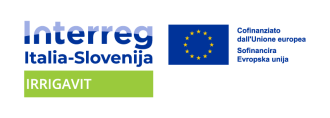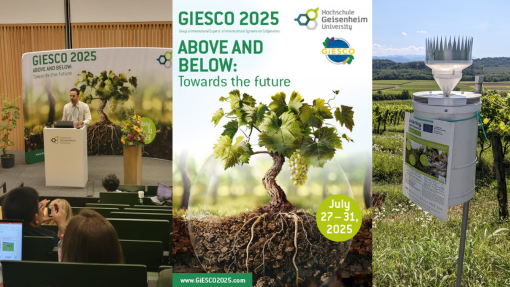Prof. Paolo Sivilotti, together with his group of early‑career researchers from the University of Udine, took part in the 23rd GiESCO International Conference, held at Hochschule Geisenheim University from 27 to 31 July 2025.
The conference, titled “Above and Below – Towards the Future”, tackled the major current and future challenges in viticulture. In particular, the programme focused on physiological responses to abiotic and biotic stresses, sustainable and organic viticulture, and soil and water management. These topics proved essential for addressing climate change and promoting biodiversity in all its forms, in line with the goals of the Interreg Italy–Slovenia IRRIGAVIT project. The event featured presentations of results and activities conducted in two cross‑border winegrowing regions — Vipavska Dolina and Colli Orientali — both experimental sites for various irrigation strategies developed under the project.
A collaborative effort between Kmetijski Institut Slovenije (KIS) and the University of Udine produced a conference poster titled “Grape and wine quality of terraced local variety Pinela (Vitis vinifera L.) under different water management” (authors: Nicola Paolinelli, Klemen Lisjak, Katja Šuklje, Dejan Bavčar, Paolo Sivilotti, Andreja Vanzo), which was presented at the conference. Following an agreement in July 2024, the young researcher Nicola Paolinelli began his PhD at the Jožef Stefan International Graduate School in Ljubljana and is employed at KIS, working on the project under the joint supervision of Dr Andreja Vanzo (KIS) and Prof. Paolo Sivilotti (University of Udine). Mirko Sodini, also from the University of Udine, delivered an oral presentation on the results and activities of the Cristian Specogna experimental vineyard, with particular focus on vineyard biodiversity promotion and soil‑management techniques, including cover cropping.
In addition to the scientific programme, one full day of the conference was dedicated to fostering direct interaction with winegrowers and identifying future challenges in grapevine cultivation. Early‑career researchers were invited to apply for the Young Researcher Award. A visit to wineries in the Rheingau Valley and surrounding areas was also organised, offering an insightful view of local cultivation and production conditions, and facilitating networking with regional growers.The conference also served to promote the “Viticulture and Enology – VITIS‑VINUM” double‑degree Master's programme, jointly offered by a consortium of leading universities: the University of Turin (in collaboration with the Universities of Milan, Palermo, Sassari, and Foggia), the University of Udine (in collaboration with the Universities of Padua, Verona, and Bolzano), and Geisenheim University.

